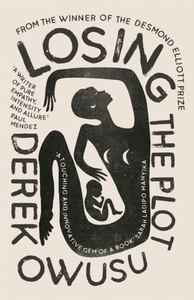Take a photo of a barcode or cover
emotional
reflective
slow-paced
Plot or Character Driven:
Character
Strong character development:
Yes
Loveable characters:
Yes
Diverse cast of characters:
Yes
Flaws of characters a main focus:
No
I really enjoyed his last book, That Reminds Me, and especially the way he blends various voices and accents from around him into something so captivating and unified.
Losing The Plot carries this on in glorious fashion, as we weave between the literary voice on the page and his asides , written in footnotes in South London slang, all as we get a beautiful insight into the relationship between a mother and son.
His love for his mother shines through on every page, a deep bond underscored by jokes, care and arguments, and the end of the book even features the transcript of Derek interviewing his mother
It is heartfelt, stunning, and incredibly clever.
I received an advance copy of this book from NetGalley in exchange for an honest review.
Losing The Plot carries this on in glorious fashion, as we weave between the literary voice on the page and his asides , written in footnotes in South London slang, all as we get a beautiful insight into the relationship between a mother and son.
His love for his mother shines through on every page, a deep bond underscored by jokes, care and arguments, and the end of the book even features the transcript of Derek interviewing his mother
It is heartfelt, stunning, and incredibly clever.
I received an advance copy of this book from NetGalley in exchange for an honest review.
This book was amazingly written. The experimentation with form: poetry and prose intertwined the author’s experience so so well. It seemed highly autobiographical, and it was really interesting to see the two cultures compared, blurred and merged as the main character tried to adapt to her new environment. It details the hardships of trying to understand, not only the language of another region, but also the idioms and every day sayings that creates an intangible barrier between cultures. This book really brought out how the aspects of our upbringings affects our lives every day, and how it would feel if those were to be completely disrupted.
Thank you to Canongate books for sending me a copy in exchange for an honest review.
Thank you to Canongate books for sending me a copy in exchange for an honest review.
emotional
fast-paced
Plot or Character Driven:
A mix
Strong character development:
Complicated
Loveable characters:
Complicated
Diverse cast of characters:
Complicated
Flaws of characters a main focus:
Complicated
emotional
funny
inspiring
lighthearted
reflective
relaxing
sad
Plot or Character Driven:
Character
Loveable characters:
Yes
Flaws of characters a main focus:
Yes
"Losing the Plot" by Derek Owusu is a poetic exploration that delves into the themes of his mother leaving home, the challenges of raising children, relationships with religion, and working conditions. The book, presented as pure poetry, brings forth a narrative that, while compelling, faces challenges in its structure that may render parts of it unintelligible.
The emotional experiences shared by Owusu and his mother might, at times, get lost in translation due to the unique structure of the book. The use of poetry demands a natural comprehension of the language to grasp the nuances, and the footnotes, while helpful to some extent, may interrupt the flow of the story, making it a challenging read.
The central topic of the book is intriguing, but the narrative difficulty associated with prose poetry can be a hindrance to some readers. Despite this challenge, the book offers a unique perspective and a profound exploration of the themes it tackles.
A standout element is the epilogue where Owusu interviews with his mother. This segment resonates as it reflects the struggles many face when trying to understand their family and cultural background, encountering barriers and deflective responses. The authenticity and relatability of this part contribute significantly to the narrative.
In conclusion, "Losing the Plot" provides an evocative journey through Owusu's experiences and reflections, though readers may find the poetic structure a barrier to full comprehension. The interview with his mother adds a poignant touch, offering a glimpse into the complexities of family dynamics and cultural understanding.
The emotional experiences shared by Owusu and his mother might, at times, get lost in translation due to the unique structure of the book. The use of poetry demands a natural comprehension of the language to grasp the nuances, and the footnotes, while helpful to some extent, may interrupt the flow of the story, making it a challenging read.
The central topic of the book is intriguing, but the narrative difficulty associated with prose poetry can be a hindrance to some readers. Despite this challenge, the book offers a unique perspective and a profound exploration of the themes it tackles.
A standout element is the epilogue where Owusu interviews with his mother. This segment resonates as it reflects the struggles many face when trying to understand their family and cultural background, encountering barriers and deflective responses. The authenticity and relatability of this part contribute significantly to the narrative.
In conclusion, "Losing the Plot" provides an evocative journey through Owusu's experiences and reflections, though readers may find the poetic structure a barrier to full comprehension. The interview with his mother adds a poignant touch, offering a glimpse into the complexities of family dynamics and cultural understanding.
I went into this book blind. I didn't know it was poetry and prose. And to preface this review you need to know I am not a fan of poetry.
I have good things to say about this book though. I think the relationship you see between mother and son is beautiful and authentic. I found the narrative difficult to follow because it isn't written in any way I have experienced before, but you can still feel the relationship between the two and how much he respects and cares for his mother.
The writing in this book is beautiful, again I didn't understand some of it (it went straight over my head) but other parts really resonated with me and are beautiful pieces of poetry.
The topic it deals with I think is an important one that needs representing more in media. The experience of moving to a country you know nothing about, raining a family and the relationship between a mother and her son.
This book has a low rating because I am the problem and not the book. I will re-read this in the future, as I have more understanding on how to read the book now.
I have good things to say about this book though. I think the relationship you see between mother and son is beautiful and authentic. I found the narrative difficult to follow because it isn't written in any way I have experienced before, but you can still feel the relationship between the two and how much he respects and cares for his mother.
The writing in this book is beautiful, again I didn't understand some of it (it went straight over my head) but other parts really resonated with me and are beautiful pieces of poetry.
The topic it deals with I think is an important one that needs representing more in media. The experience of moving to a country you know nothing about, raining a family and the relationship between a mother and her son.
This book has a low rating because I am the problem and not the book. I will re-read this in the future, as I have more understanding on how to read the book now.
challenging
emotional
reflective
fast-paced
Plot or Character Driven:
Character
Strong character development:
Yes
Loveable characters:
Yes
Diverse cast of characters:
Yes
Flaws of characters a main focus:
No
reflective
medium-paced
Plot or Character Driven:
Character
Strong character development:
Yes
Loveable characters:
Yes
Diverse cast of characters:
Yes
Flaws of characters a main focus:
Yes
challenging
emotional
reflective
fast-paced
Plot or Character Driven:
Character
Strong character development:
Complicated
Loveable characters:
Complicated
Diverse cast of characters:
Yes
Flaws of characters a main focus:
Complicated
Losing The Plot is far from an easy read on several fronts. From subject matter to the style and structure, this book tests the reader. Not that it's a bad thing, like. In fact, Losing the Plot is a tender exploration of migration and parenthood.
Initially, I thought this was a work of nonfiction, but it’s the transcription of a supposedly “factless interview” between the protagonist, a Ghanaian woman who emigrated to Britain in her youth (much like Owusu’s mother), and her son.
Owuso writes in lyrical, almost poetic verse, dealing with familiar immigrant tropes: displacement, alienation and longing. Alongside his mother's voice, Owusu deftly weaves his own narrative voice into the plot. The multilayered narrative voice represents an intimate yet often terse interaction between generations. Here, the past, present and future are intertwined with emphatic effect.
I particularly enjoyed Owusu’s use of combinations of Twi, British slang, and standard English to juncture the divergence and overlap of identities. Of course, we often present different versions of ourselves depending on the situation and company we are in.
Conversely, I found the sporadic sidenotes, interpolating the narrative disruptive at times. It is hard to engage with the verse linearly when your attention is haphazardly pulled across the page so frequently. Saying that the information was helpful, but perhaps footnotes would be better.
Losing the Plot is an unusual little book; it could be easily argued that there is no plot, and yet it's immersive and immensely readable. Also, that cover art is stunning, isn't it? 3.5⭐
Thank you to Canongate Books for kindly sending me a copy; as always, this is an honest review.
Initially, I thought this was a work of nonfiction, but it’s the transcription of a supposedly “factless interview” between the protagonist, a Ghanaian woman who emigrated to Britain in her youth (much like Owusu’s mother), and her son.
Owuso writes in lyrical, almost poetic verse, dealing with familiar immigrant tropes: displacement, alienation and longing. Alongside his mother's voice, Owusu deftly weaves his own narrative voice into the plot. The multilayered narrative voice represents an intimate yet often terse interaction between generations. Here, the past, present and future are intertwined with emphatic effect.
I particularly enjoyed Owusu’s use of combinations of Twi, British slang, and standard English to juncture the divergence and overlap of identities. Of course, we often present different versions of ourselves depending on the situation and company we are in.
Conversely, I found the sporadic sidenotes, interpolating the narrative disruptive at times. It is hard to engage with the verse linearly when your attention is haphazardly pulled across the page so frequently. Saying that the information was helpful, but perhaps footnotes would be better.
Losing the Plot is an unusual little book; it could be easily argued that there is no plot, and yet it's immersive and immensely readable. Also, that cover art is stunning, isn't it? 3.5⭐
Thank you to Canongate Books for kindly sending me a copy; as always, this is an honest review.
i didn‘t get it, i was confused the whole time
my review reflects only my personal reading experience (how i felt while reading it; how easy or hard it was to get through; whether or not i was in the right headspace for it; etc.) of this book and not necessarily the content
my review reflects only my personal reading experience (how i felt while reading it; how easy or hard it was to get through; whether or not i was in the right headspace for it; etc.) of this book and not necessarily the content








